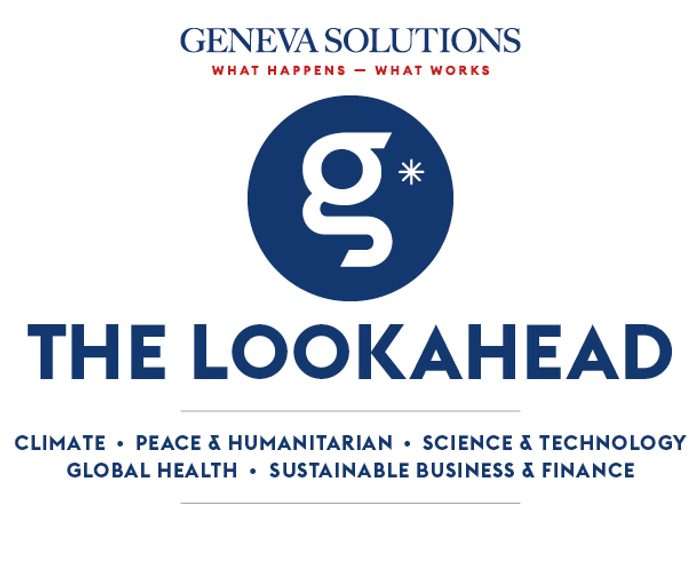Hello, this is Kasmira. Talks on an accord to make sure that the world is better prepared for, and protected from, the threat of future pandemics are expected to go down to the wire this week as negotiators run short of time and political will.
Two other key meetings in Geneva this week will focus on the use of deadly weapons that largely claim civilian lives – cluster munitions and mines. Plus, don't forget to join us this Thursday at the Geneva Press Club to discuss the future of international Geneva in the wake of aid cuts by major public donors, namely the US. |

|

Healthcare workers from Prague Ambulance Service transport a Covid-19 patient to Semily Hospital in the Czech Republic, 18 March 2021. (Keystone/EPA/Martin Divisek)
|
|
Last chance saloon for pandemic treaty talks.
More than 190 countries will this week launch a last-ditch attempt to finalise the world’s first pandemic treaty, even as seismic global changes and a budgetary crisis at the World Health Organization (WHO) stemming largely from the United States’ exit have further muddied prospects of reaching an already contentious deal.
Geneva Solutions (EN)
|
|
|
What else to watch this week
|
|
|
🧨WHEN TABOOS TURN TACTICAL.
Two key meetings are happening back to back this week in Geneva that will put the spotlight on the growing pressure on international law banning the use of dangerous weapons deemed “unacceptable” due to how harmful they are for civilians.
|
|
Today and tomorrow,
the 123 state parties to the Convention on Cluster Munitions – weapons that disperse explosive submunitions that often end as duds and act as landmines – are set to meet for their annual gathering to discuss progress in complying with the 2010 convention.
|
|
From Wednesday to Friday
national mine action directors and UN advisers are meeting to discuss pressing challenges and solutions for demining work. Convened by the UN Mine Action Service and the Geneva International Centre for Humanitarian Demining, the meeting comes on the heels of an International Mine Awareness Day on Friday, marked by resounding alarms from campaigners worried about the rise in militarisation.
|
|
Drumbeat of war.
In light of a feared US retreat, Europe has rushed to bolster its defences, and some are having second thoughts about their commitments to disarmament as they weigh the Russian threat. Poland, Lithuania, Latvia, Estonia and Finland, all Nato members, have announced plans to exit the Ottawa treaty banning mines, threatening to unravel one of the most successful weapons treaties out there.
In a rare joint statement, the International Committee of the Red Cross, several national Red Cross chapters and their international federation called the move “a dangerous setback for the protection of civilians in armed conflict”.
Tamar Gabelnick, director of the International Campaign to Ban Landmines (ICBL), highlighted the threat they pose to civilians: “To suggest that landmines can be used ‘responsibly’ is dangerously misguided — mines cannot distinguish between soldier and child, and civilians will always make up the vast majority of the victims.”
📖 Read our past coverage about landmines.
The trend extends beyond mines. Lithuania completed early March its withdrawal from the Cluster Munitions Convention, which the Philippines' ambassador and this year’s president of the convention, Carlos Sorreta, described as an “unprecedented decision that risks eroding the norms and principles that prohibit the use of cluster munitions” and said he hoped others wouldn’t follow suit.
Other non-signatories have also been accused of undermining the stigma of using the weapons the convention has built. The United States began supplying Ukraine with cluster bombs in 2023 for its counteroffensive against Russia, which has been using them extensively.
|
|
Money troubles.
To top it off, efforts to demine and to destroy cluster weapons stockpiles are facing funding threats. US aid cuts have hampered demining programmes across 30 countries, according to the ICBL, which said the US alone covers about 40 per cent of foreign funding for demining.
|
|
A reason for hope.
Still, there has been progress worth celebrating. The Fondation Suisse de Déminage has said that 70 per cent of accessible territory in Ukraine – the world’s most heavily mined country – is now free of landmines and unexploded ordnance.
The organisation will be testing a drone with a ground-penetrating radar that could potentially speed up efforts to demine the entire country, projected to last decades into the future. Ukraine is holding a workshop on this issue today.
– By Michelle Langrand
|
|

|
|
💸US aid cuts: what strategy to save International Geneva?
International Geneva and the Swiss government have watched with consternation as the United States and several other nations reduce their financial contributions — and in some instances, even withdraw political support — from some of the 40 international organisations and 476 NGOs that call Geneva home. Organisations like the International Organization for Migration and the UN Refugee Agency have already announced thousands of layoffs. Uncertainty abounds for some 36,000 foreign civil servants who work here and for agencies whose collective annual expenditures exceed CHF4 billion, crucially supporting the local economy.
What strategies are Geneva's local authorities and the Swiss federal government considering to reinforce the strength and resilience of international Geneva? Are they prepared to address the threats facing a multilateral system originally designed in the wake of World War Two to foster peace and diplomacy? What actions should local and federal leaders take to successfully navigate this evolving diplomatic and economic landscape?
🗓️12:15 pm, 10 April
📍Domaine de Penthes & online
🎙 Speakers include:
⭐ Béatrice Ferrari, director of international affairs, state of Geneva
⭐Carlo Sommaruga, Geneva state councillor
⭐Nicolas Walder, Swiss national councillor
⭐Fabrice Eggly, director of the Fondation pour Genève
⭐Nicolas Bideau, spokesperson of the Swiss Federal Department of Foreign Affairs (TBC)
Moderated by Luisa Ballin, UN-accredited journalist, and Kasmira Jefford, editor-in-chief of Geneva Solutions.
The discussion will be in French only.
🔗 Register now to attend in person or online.
|
|
|
GS news is a new media project covering the world of international cooperation and development. Don’t hesitate to forward our newsletter!
Have a good day!
|

|
|
Avenue du Bouchet 2
1209 Genève
Suisse
|
|
|
|









